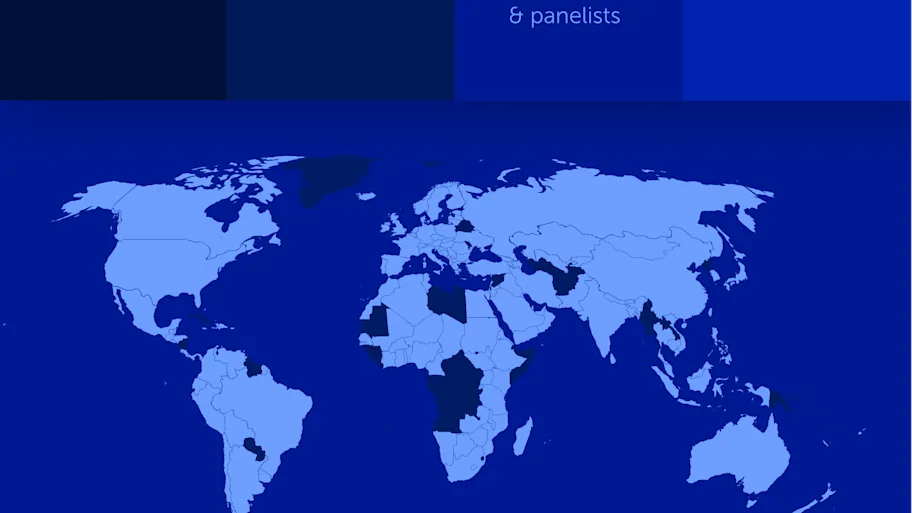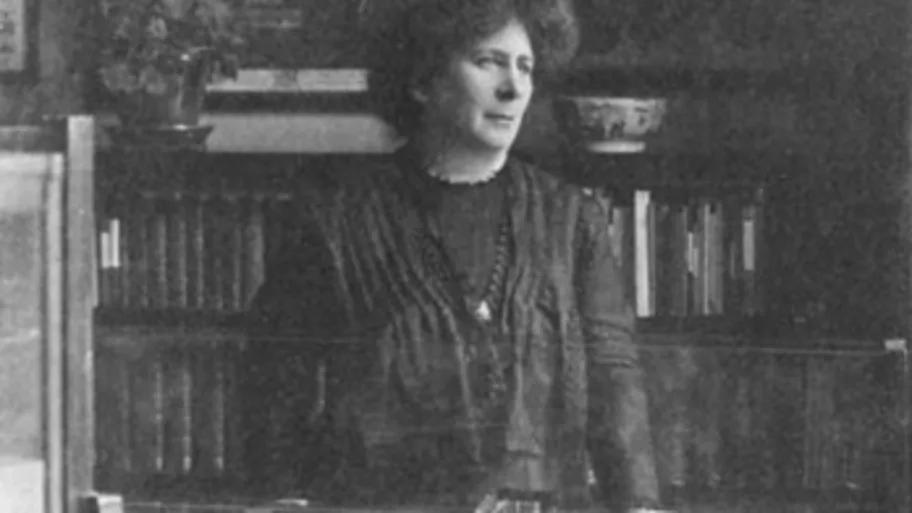
- Science news
- Featured news
- Phoebe Koundouri and Marina Della Giusta – Women supporting women
Phoebe Koundouri and Marina Della Giusta – Women supporting women
By Leticia Nani Silva , Rocio Caverzasi and Geraldine Clancy
To celebrate International Equal Pay Day, we speak to the new Field Chief Editors of our Economics journals Professor Phoebe Koundouri and Professor Marina Della Giusta.

Photo redit: Mrs Kattirzi via Frontiers
Professor Phoebe Koundouri is an economics professor and world ambassador for sustainable development. She is listed in the 1% of most-cited women economists in the world. She holds two professorship titles, one at the Athens University of Economics and Business, and the other at the Technical University of Denmark. In addition to her academic roles, Professor Koundouri is the founder and Chair of the Alliance of Excellent for Research and Innovation on Aeiphoria (AE4RIA), President of the European Association of Environmental and Natural Resource Economists (EAERE), Chair of the SDSN Global Climate Hub, co-Chair of the United Nations Sustainable Development Solutions Network for Europe and Greece, Director of the Research Laboratory on Socio-Economic and Environmental Sustainability (ReSEES) at Athens University of Economics and Business, and of the Sustainable Development Unit & EIT Climate-KIC Hub Greece of the European Institute of Innovation and Technology at “Athena” Research and Innovation Center . Moreover, she is an elected member of Academia Europae in the section Economics, Business and Management Sciences , elected Member of Board of the Trustees of the World Academy of Art and Science (WAAS) and member of the InterAcademy Partnership (IAP) Board.
Professor Della Giusta is currently at the University of Turin and has a visiting professorship at the University of Reading and a fellowship at IZA, a non-profit research institute in labor economics. Her area of research particularly focuses on gender, bias and diversity in education and labor markets. Furthermore, she has been involved in the development of international projects and government policies in the UK. Professor Della Giusta is also a proud member of the Women’s Committee of the Royal Economics Society. Finally, Professor Della Giusta is a leader in the IN-HABIT project that works on enabling behavior change specifically focusing on gender and diversity.
The main priority during this conversation was gauging their experiences working as a female in economics, as well as understanding how we, women, can work together to support other females coming into a world very often dominated by males. In the interview, we discuss a range of topics spanning from the Sustainable Development Goals, the Gender Gap report, universities, scientific workforce, labor markets, among others. We hope that our conversation will spark many discussions within companies around the world in order to make a change in our leadership teams and to see the change we so desperately need.
According to The Gender Gap Report, it will take another 132 years to achieve gender equality.
“Looking across our history, 132 years at this present moment is a long time. However, if we compare it to the many years that we have already fought for equality, 132 years is considered the ‘final sprint’.”
Professor Koundouri
Professor Della Giusta says that we have seen this data for a long time, however the worse news comes from the field of economics, which seems to be stagnating in terms of female representation. If markets functioned perfectly, the pay-gap is the kind of imperfection that shouldn’t exist for very long, says Prof. Della Giusta, so considerable amounts of research have been carried out in economics to understand its causes and persistence and there is a vast body of evidence pointing to segregation of women in low paying professions and the effect of career breaks on pay, but also on discrimination in hiring, pay and promotion.
Prof. Koundouri is convinced that giving women a chance to climb the ladder is only part of the equation. The other part is supporting women whilst they climb. It’s not just about the plan, but also about the implementation of the plan and its supervision. Having the right systems to monitor change and support women within all the different workforces means not only supporting them financially, but also, and most importantly, supporting them psychologically and legally across their careers. As much as it is a societal challenge, it is also a cultural one. One needs to recognize that a cultural shift needs to occur in order to grant women a seat at the table, a chair in the executive meetings, and a title that allows them to secure respect of their male counterparts.
“We often say that it is the workplace that needs to change. The opportunities tend to coincide with the peak fertility years, so women tend to suffer from the concept of parental penalty. We need to focus on making existing workplaces ready for these kinds of changes, not only in the case of gender, but every single aspect of diversity.”
Professor Della Giusta
As much as it is a societal challenge, it is also a cultural one that needs men to accept the challenge of being measured along the same yardstick as women, which is in itself is a costly process. One needs to recognize that a cultural shift needs to occur in order to grant women a seat at the table, a chair in the executive meetings, and a title that allows them to deem respect by their male counterparts, and this cultural shift is not just about making women more confident or ambitious (evidence suggests that they are!): it is the workplace that needs to change, if the right opportunities are to be provided, says Prof. Della Giusta. The opportunities tend to coincide with the peak fertility years, and women pay a significant parental penalty which means a permanent reduction in earnings over the career path once they have the first child, compared to childless women with identical skills. This penalty is not paid by men. We need to focus on making existing workplaces ready for these kinds of changes, not only in the case of gender, but every single aspect of diversity if we are to value talent regardless of physical appearance.
With 2030 approaching fast, the agenda for the Sustainable Development Goals is becoming more and more of a priority for all organizations. There are still so many countries that are extremely behind where they need to be in terms of achieving a close equilibrium between genders. Take, for example, Prof. Koundouri’s two professorships - one in Greece and the other in Denmark. She comments on how there is a clear difference between the ratio of men and women in her economics department. Countries that are more progressive with their mission, such as Denmark, show a more balanced ratio between males and females across the economics sector compared to less progressive countries where there is still a large discrepancy.
Another main issue we focus on is the cultural aspect of women in male-dominated workforces. We start off the conversation by talking a little about our responsibilities within the field of economics, and how we were heavily supported by our culture and families. So much so, that today we must be ambassadors and families for those women who do not have the cultural or familial support when it comes to choosing a career in economics. We discussed the concept of ‘women helping women’. It is an incredible phrase that means so much to so many women across the world. ‘Women helping women’ isn’t only about financial help or providing women with equal opportunities, it is about listening about women’s accomplishments, understanding their stories and experiences, providing solutions to overcoming gender stereotypes and society stigmas.
It is of paramount importance for those who have risen to the top to help those who are growing in their careers. Prof. Della Giusta feels a massive responsibility to support women in economics grow within the field and flourish in their careers. Those women who are not willing to support the younger and up-and-coming generation need to re-evaluate their priorities and lend a hand. It is important to become a mentor and aspiration for the new talent rising throughout the whole labor market.
We are at a revolutionary point in history where we need to extend the support and create a safety net for women to feel comfortable progressing into senior leadership roles within any industry. Prof. Koundouri comments on the fact that she has an extremely supportive family, and this should be the case for both men and women. Professional success comes through the acknowledgement from your family that this career path is important to you and your society. On the other hand, Prof. Della Giusta comments on how even though it is important to find support throughout your career, it is equally important for women to be comfortable in their work setting, whilst having the necessary tools on how to become better negotiators and how to become more confident in climbing up the career ladder. Therefore, mentoring both in and outside your organization is crucial. Women need different types of support at different stages of their lives and careers.
We all need to work together in order to raise each other up and support one another in the career paths. There is still a lot of work to be done within every country, however, it will never be accomplished if we are alone and if we don’t start acting and monitoring the progress made. It takes a village to cultivate great leaders and an even bigger worldwide community to allow them to flourish.

Frontiers is a signatory of the United Nations Publishers COMPACT. This interview has been published in support of United Nations Sustainable Goal 5: Achieve gender equality and empower all women and girls.
About Frontiers
Frontiers is the 3rd most-cited and 6th largest research publisher. We publish groundbreaking discoveries by the world's top experts. Scientists empower society and our mission is to accelerate scientific discovery by making science open. We place the researcher at the center of everything we do and enable the research community to develop the solutions we need to live healthy lives on a healthy planet. Featuring custom-built technology, artificial intelligence, and rigorous quality standards, our research articles have been viewed more than 2 billion times, reflecting the power of research that is open for all.






